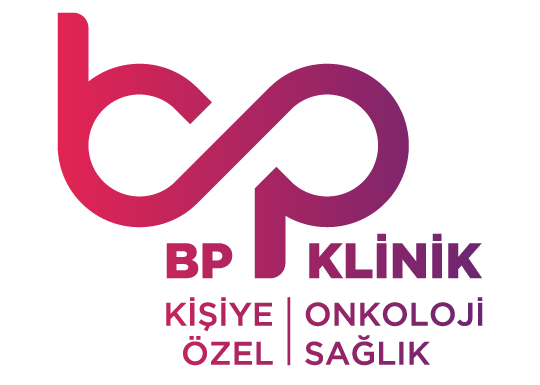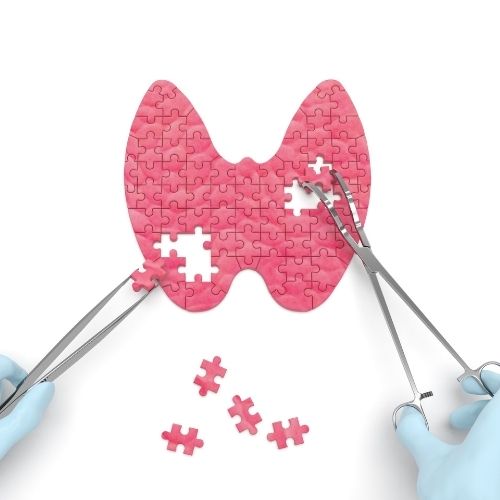What is Thyroid Cancer?
The thyroid gland is a butterfly-shaped gland located at the base of our neck, under the structure called the Adam’s apple, and plays a major role in the metabolism of the body. Thyroid cancer occurs as a result of abnormal changes in the cells of this gland. The thyroid gland, which has an important place in body metabolism, produces hormones that coordinate heart rate, blood pressure, body temperature and weight. With the application of the right treatments in thyroid cancer, the recovery rate is high.
What are the symptoms of thyroid cancer?
In general, no symptoms are observed at early stages of thyroid cancer. Symptoms seen in the following process may include a lump in the neck that can be felt on the skin, hoarseness, changes in the voice, difficulty in swallowing, pain in the throat and neck, swelling of the lymph nodes.
What are the causes of thyroid cancer?
As with most types of cancer, the factors that cause thyroid cancer are not known for certain. However, it is known that the cells in the thyroid gland turn into tumor cells as a result of mutation. These abnormal cells can spread to nearby tissues as well as spread to the whole body.
What are the risk factors for thyroid cancer?
Thyroid cancer is more common in women than men. Exposure to high doses of radiation is also a risk factor for thyroid cancer. Hereditary syndromes coming from the family and genetic structure are also in the risk group.
How is thyroid cancer diagnosed?
Medical history and physical examination are the first steps. At this point, tumor symptoms in the head and neck region are examined. Information about the person’s history of the disease is obtained and family history is questioned. Afterwards, some tests are used to understand the diagnosis.
Thyroid function test
To get information about the functioning of the thyroid gland, TSH, the thyroid stimulating hormone, is evaluated with a blood test.
T3 and T4
The levels of T3 and T4 thyroid hormones produced by the thyroid gland provide us with information about the functioning of the gland.
Thyroglobulin
After the treatments applied, the thyroglobulin level decreases. If this level does not decrease, it gives the information that thyroid cancer is still present.
Calcitonin
It is the hormone that regulates the calcium level. It is produced by C cells in the thyroid gland. These cells support the development of medullary thyroid cancer in some cases. With the level of this hormone, the presence of cancer or recurrence after treatment can be detected.
Surgical
One of the treatment methods applied in thyroid cancer is surgery. With this operation, all or part of the thyroid gland can be removed, depending on the situation. Complete removal of the gland is called thyroidectomy. With this method, the thyroid gland is removed from the body and then drugs are used to perform the function of the gland. In some cases, the swollen lymph nodes in the neck can be removed while the thyroid gland is removed. Removal of part of the thyroid gland is called thyroid lobectomy. In cases where the tumor occupies a small region, removal of only one or more lobes of the thyroid gland is a form of treatment. Surgery should be performed with care to avoid damage to nearby structures such as the parathyroid gland.
Thyroid hormone therapy
After the thyroid gland is removed from the body, there are some drugs that will perform the function of this gland. These drugs stimulate the production of thyroid hormone and work to suppress the production of thyroid stimulating hormone produced by the pituitary gland. A high TSH level can stimulate their growth if there are any remaining cancer cells.
Radioactive Iodine
This treatment can be used to destroy small cancerous regions left after surgery. In addition, radioactive iodine therapy is used in cancers that relapse and spread to different parts of the body. Radioactive iodine can be taken as a capsule or liquid. Side effects may include dry mouth and eyes, nausea, change in sense of smell and taste, and fatigue. Since this radioactive substance is first taken up by cancerous cells in the thyroid gland, normal cells are not harmed. Most of these substances are excreted through urine after treatment.
Radiation Therapy
Radiation therapy aims to destroy the cells in the tumor region with the use of X-rays. This treatment can also be used after surgery if there is a risk of recurrence of the cancer.
Chemotherapy
It is a drug treatment applied to destroy cancer cells. The chemicals spread throughout the body and kill cancerous cells. It can be combined with radiotherapy in people with anaplastic thyroid cancer.
Injecting alcohol into the cancer
The alcohol ablation procedure is used for small tumors and involves the injection of alcohol into small thyroid cancers. This treatment can also be preferred in regions that are not easily accessible.
Targeted drug therapy
Targeted drugs using mechanisms that attack vulnerabilities in cancer cells can be used to treat thyroid cancer. A number of drugs work by targeting signals that transmit the growth and division of cancerous cells. It can be preferred in patients with advanced stages.
Supportive (palliative) care
It is a supportive treatment used to reduce the patient’s complaints and alleviate their symptoms. It is applied for individuals suffering from cancer to live more comfortably.
For detailed information on this subject, please use the contact page.

